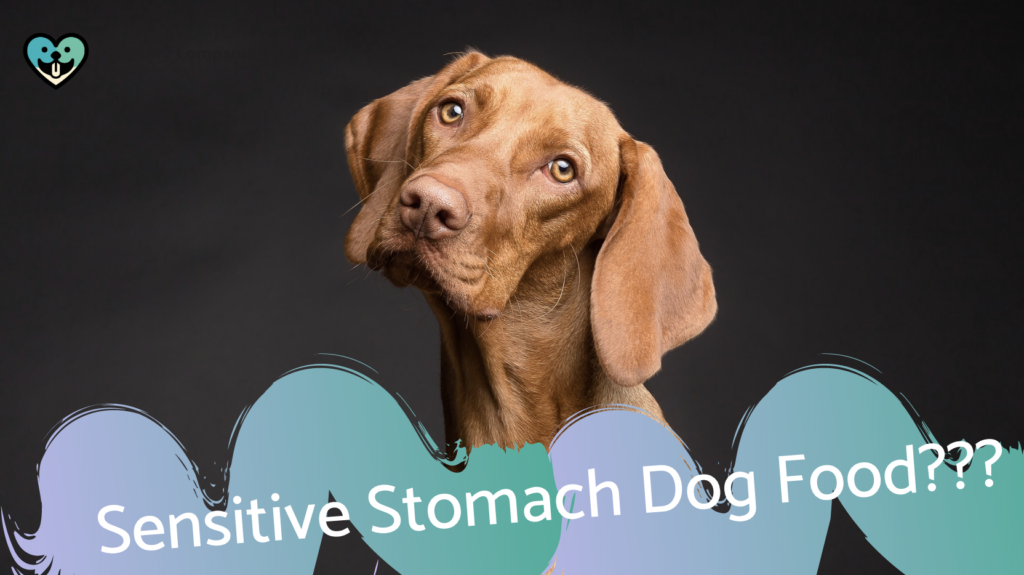Table of Contents
Looking for dog food for dogs with sensitive stomachs?
If you are looking for the best dog food for sensitive stomachs, keep on reading. The Furry Companion will present you with the information you need to know about the best dog food for dogs with sensitive stomachs.
Are you aware that the best wet dog food is composed of around 70% to 80 % moisture and have a small proportion of soft kibble in them? Dog food with high moisture content have lower carbohydrates and more quality protein.

Whether you’re an owner yourself or an average dog lover, being in the company of man’s best friend contributes to your overall well-being. Dogs have been known to improve heart health, reduce stress, and, in some cases, can also help improve mental health. These friendly creatures are, down to their core, pure in their form and only deserve the best kind of care.
Dogs have their basic needs: food, exercise, water. However, it’s important to be aware of any special needs they may have.
These needs may include allergies, the kinds of diseases they’re prone to, and whether they’re sensitive to a particular food.
The Furry Companion is here to keep both pet owners and animal lovers well-informed, to provide tips, and to update you on the latest trends. In this article, we discuss what it’s like to deal with dogs with sensitive stomachs. We will also help you identify the telltale signs and discuss how switching to sensitive stomach dog food can be helpful to our furry family member.

How can I tell if my dog has a sensitive stomach?
Like us, dogs can experience stomach pain, too. Some dogs are particularly susceptible to the occasional upset because of their sensitive stomachs. Patrick Mahaney, DVM says, “It’s very common for dogs to have sensitive stomachs, in part because dogs are curious and explore the world through their mouths.” In addition to senior dogs and puppies, smaller breeds like the Scottish Terrier and the Yorkie are more prone to this condition. Sensitive stomachs are easy enough to spot. A few of the common telltale signs include the following:
Hypersalivation
Lack of appetite
Vomiting. While the occasional throw-up is not necessarily a cause for concern, you should still keep an eye on your pet when this occurs.
Intermittent diarrhea. Soft stool is a common symptom of sensitive stomachs. Diarrhea is especially true if your dog’s meal doesn’t quite agree with their digestive tract. Loose bowels may also occur following a drastic shift in diet.
Excessive or frequent flatulence.Yes, dogs fart too! Dogs sometimes swallow too much air from eating too quickly or from a gastrointestinal problem.
While it’s important to watch out for these, a manifestation doesn’t always automatically mean our pets have sensitive stomachs. This scenario is especially true when these signs are accompanied by other symptoms such as dehydration, the appearance of blood in urine or poop, fever, lack of energy, and the like.
It’s crucial to first rule out any serious medical conditions by heading to your veterinarian before assuming our buddies have nothing more than a sensitive stomach. After all, our pets can get sick too. Should your vet be unable to pinpoint a health issue upon examination, it may be time to reexamine and evaluate your pet’s diet.

What is sensitive stomach dog food?
Sensitive stomach dog food is specially-formulated food intended for your pet’s easier digestion and comfortable consumption. Sensitive stomach dog food is made up of a limited number of high-quality ingredients which are highly digestible and gentle on your furry companion’s gastrointestinal tract. Digestibility, the measure of the number of nutrients absorbed by the body, reflects a food’s ability to deliver essential nutrients to the dog eating it. Ultimately, it can also influence our four-legged friends’ long-term health and everyday concerns, like the appearance and consistency of their stools.
Dogs with sensitive stomachs require food suited to their specific needs. Some ingredients are more digestible than others. As such, sensitive stomach dog food is made up of whole ingredients, including high-grade meat such as beef, lamb, and salmon. Ingredients also include carbohydrates such as rice and oatmeal, as well as essential amino acids and nutrients such as zinc to help nourish a dog’s coat. “There’s a number of sensitive stomach dog food formulas, but not every one of them will fit every case and pet,” Dana Brown, DVM points out.
Dietary fat is necessary for good health, even in dogs. However, these fats are more complex and not as easily digestible compared to protein and carbohydrates. When looking for sensitive stomach dog food, veterinary nutritionists recommend a moderate but sufficient amount of fat (12% to 15% on a dry matter basis) for our pets with sensitive stomachs.
What should I take note of before making the switch?
There is no particular root cause of sensitive stomachs in dogs other than, simply being born with it. Our furry companions’ nutritional needs change depending on their age—puppy stage, adolescent stage, senior stage. Their needs may also be dependent on specific health conditions, such as diabetes, obesity, or in this case, sensitive stomachs.
Switching to sensitive stomach dog food, however, shouldn’t be done immediately. While dogs may have shown intolerance toward particular food, it’s still essential to modify their diet gradually before making the complete switch. Drastic or sudden diet changes may result in an even more upset stomach.
Proper diet and overall health are important, even in pets. Sensitive stomach dog food can enhance the nutrition of pets. Each formula is made up of a different combination of vitamins, healthy fat, protein, and carbohydrates. It’s crucial to find the best fit for our dogs to ensure they have a complete and balanced diet. Additionally, sensitive stomach dog food will help avoid unpleasant scenarios such as chronic vomiting and episodes of diarrhea. Sensitive stomach dog food will help prevent intolerance, especially for pets dealing with these particular gastric conditions.
Dog Food Ingredients to Avoid
Labels can be misleading. Switching our furry companions to sensitive stomach dog food may not necessarily be enough. We must remain wary of the selection and pay attention to specific ingredients in our choice of dog food. Top-quality picks are packed with protein, healthy fats, highly digestible carbohydrates, as well as vitamins and minerals.
Always check the protein and fiber source of your pet’s food. See to it that it is appropriate for dogs. Some sources of these macronutrients are common food-related causes of dogs’ upset stomachs. The quality of ingredients of the food they’re eating is key to proper digestion and overall health.
The ten ingredients pet owners and animal lovers should watch out for in their dog food are the following:
Wheat
While rich in fiber and contribute to humans’ overall digestive health, wheat isn’t as easily digestible for dogs. Wheat offers very little nutritional value for our pets. It’s best to avoid food with wheat ingredients such as wheat flour.
Gluten
This protein is common in wheat, barley, and rye. As a rule of thumb, it’s best to avoid this ingredient because a lot of dogs are sensitive to gluten.
BHA/BHT
These are chemical preservatives often used in pet food. However, it’s better to opt for pet food which use natural preservatives instead to avoid other health problems.
Colors
Artificial coloring has no benefit or nutritional value whatsoever. Manufacturers use them primarily for aesthetic purposes, even in sensitive stomach dog food.
Corn Syrup
Sweeteners, whether natural or artificial, offer no benefit or nutritional value to dogs.
Soy
While soy is a viable alternative protein source for humans, they aren’t as valuable for dogs. Additionally, soy can cause bloating and gas in dogs.
Rendered Fat
Not all fat is unhealthy. Even our dogs stand to benefit from healthy fats such as chicken fat, primarily because they’re excellent sources of energy and nutrition. On the other hand, rendered fats such as poultry fat and animal fat are low in quality.
Propylene Glycol
Propylene glycol is an ingredient used to preserve moisture in wet food and often found in antifreeze. However, it can be toxic in high doses.
Animal By-Products
High-quality sensitive stomach dog food is made up of whole ingredients. Animal by-products are, in essence, cheap fillers.
Corn
Like wheat, corn can be extremely healthy for humans. However, much like wheat, corn isn’t as easily digestible for dogs and offers little nutritional value. “A dog’s body cannot process corn properly. It is difficult for them to digest it. Corn is a cheap filler, a starchy energy which serves little to no nutritional value,” Roger Welton, DVM explains.
Our Top Picks for Sensitive Stomach Food For Dogs

Ollie Dog Food
The high-quality dog food is so delicious; you might even be tempted to try it. Ollie’s Dog Food contains no corn, soy, wheat, preservatives, or artificial ingredients. This sensitive stomach dog food includes fruits, veggies, and Australia- and US-sourced meats. Each batch is cooked at low-temperature heat to preserve the nutrients. The best part? Ollie customizes your furry companion’s food based on their age, lifestyle, and known health conditions.
CANIDAE All Life Stages Lamb Meal & Rice Formula Dry Dog Food
What makes CANIDAE a great choice is how it’s specially formulated by vets to be highly digestible. It can be given to dogs at any age, whether your little buddy is still in his puppyhood or getting ahead on the years. This particular sensitive stomach dog food is fortified with probiotics and omega-3 and omega-6 fatty acids. These ingredients contribute to ensuring your dog’s gastrointestinal tract is working well and aids in maintaining good fur condition. See Customer Reviews and Ratings here.
Hill’s Science Diet Sensitive Stomach & Skin Dry Dog Food
Hill’s Science Diet Sensitive Stomach and Skin Dry Dog Food includes several veggies, fruits, antioxidants, and is fortified with vitamins, minerals, and amino acids. This choice of sensitive stomach dog food is an excellent source of prebiotic fiber which helps support a balanced gut. It’s also formulated to be highly digestible and helps with the growth of a thick and shiny coat on your dog. See Customer Reviews and Ratings here.
Purina Pro Plan Focus Sensitive Skin and Stomach Salmon Rice Formula Dry Dog Food
Unlike other choices out in the market, the ingredient most featured by this sensitive stomach dog food is salmon. It’s packed with antioxidants to help ensure proper immune function. Moreover, it doesn’t use corn, wheat, soy, or any other artificial flavoring in its formula. The whole ingredients used by Purina helps promote your dog’s overall digestive health. See Customer Reviews and Ratings here.
Diamond Care Sensitive Stomach Formula For Adult Dogs
If your dog has a sensitive stomach but truly loves dried eggs, this dog food is best for your companion. Egg products are easy to digest and also include an exceptionally high nutritional value. Additionally, it also contains potatoes, tomato pomace, and chicken fat. These ingredients combined together contain 80% protein content. See Customer Reviews and Ratings here.
Final Words
If the sensitive stomach dog food you initially buy doesn’t work, don’t get discouraged. Different dogs would respond differently to these various foods. There is no one-fit-all dog food that will work for every dog’s sensitive stomach. While it might take some time, it will be worth it once you see your pet in high energy again.
Furthermore, while sensitive stomach dog food is one way to resolve your dog’s upset stomach, it is not the only thing they need. Always check with your vet if your dog needs a prescription diet to address their condition. They can also provide a tailored diet plan for your dog’s needs.
We hope this article helps in bringing back your dog’s top condition with a healthy stomach!
FAQs on the Best Sensitive Stomach Dog Food
What food is best for a dog with a sensitive stomach?
For dogs with sensitive stomachs, it’s important to choose foods that are easily digestible and low in fat. Foods that are high in lean proteins, such as cooked, skinless chicken or turkey, are often recommended. It’s also beneficial to include easily digestible carbohydrates like cooked white rice or sweet potatoes. Some commercial dog foods are specifically formulated for sensitive stomachs and may include prebiotics and probiotics to aid digestion.
What dog food is easiest on the stomach?
Dog foods that are easiest on the stomach typically contain limited ingredients to minimize the risk of upsetting the dog’s digestive system. Look for brands that use high-quality, easily digestible proteins like chicken, lamb, or fish, and avoid those with excessive fillers, artificial colors, and preservatives. Grain-free options can also be gentler for some dogs, though this varies depending on the individual dog’s needs and sensitivities.
What foods help dogs with stomach issues?
Foods that can help dogs with stomach issues include bland, easily digestible items like boiled chicken (without skin and bones), white rice, pumpkin (plain, canned pumpkin), and oatmeal. Probiotic-rich foods like plain yogurt can also be beneficial. It’s important to introduce these foods gradually and in small portions to avoid further upsetting the stomach.
What are the symptoms of a sensitive stomach in dogs?
Symptoms of a sensitive stomach in dogs can include vomiting, diarrhea, flatulence, burping, and occasional loss of appetite. Some dogs may also experience abdominal discomfort and changes in stool consistency or frequency. If these symptoms are persistent or severe, it’s important to consult a veterinarian, as they could be indicative of a more serious underlying condition.
Is wet or dry food better for dogs with sensitive stomachs?
Whether wet or dry food is better for dogs with sensitive stomachs depends on the individual dog. Wet food can be easier for some dogs to digest and more palatable, which can be beneficial for dogs with decreased appetites. Dry food, on the other hand, is more energy-dense and may be better for maintaining dental health. Some dogs may benefit from a combination of both. It’s important to choose a high-quality product specifically designed for sensitive stomachs.
Is fish good for dogs with sensitive stomachs?
Fish can be a good option for dogs with sensitive stomachs, as it’s typically easy to digest and high in omega-3 fatty acids, which can reduce inflammation. It’s important to choose plain, cooked fish without added oils or seasonings. Fish like salmon, cod, and whitefish are commonly used in dog foods formulated for sensitive stomachs.
What vegetables are good for dogs with sensitive stomachs?
Vegetables that are good for dogs with sensitive stomachs include pumpkin, sweet potatoes, carrots, and green beans. These should be cooked and served plain, without any added spices or oils. These vegetables are high in fiber and nutrients, aiding in digestion and providing essential vitamins and minerals.
What is the easiest protein for dogs to digest?
The easiest proteins for dogs to digest are typically lean meats like chicken, turkey, and whitefish. These proteins are low in fat and do not have the connective tissues and fats that make red meats harder to digest. For dogs with particularly sensitive stomachs, it’s often recommended to use these proteins in a cooked, unseasoned form.
Are eggs OK for dogs with sensitive stomach?
Eggs can be okay for dogs with sensitive stomachs, as they are a good source of easily digestible protein. However, they should be cooked (boiled or scrambled) without any added oil, butter, salt, or seasonings. It’s important to introduce eggs into the diet slowly and in small amounts to ensure they don’t cause any digestive upset.
Does eating grass help a dog’s upset stomach?
Eating grass is a common behavior in dogs and may help with an upset stomach, although the exact reason why dogs eat grass is not fully understood. Some theories suggest that grass can help induce vomiting to relieve stomach discomfort, while others propose that grass eating is a way to add fiber or nutrients to the diet. However, it’s important to ensure that the grass your dog eats is free of pesticides and other chemicals. If a dog is eating grass excessively or showing signs of illness, it’s advisable to consult a veterinarian.

